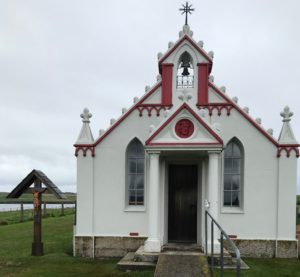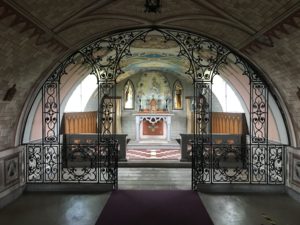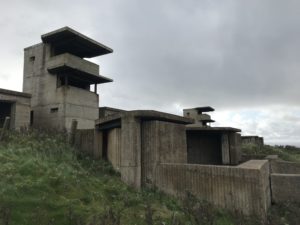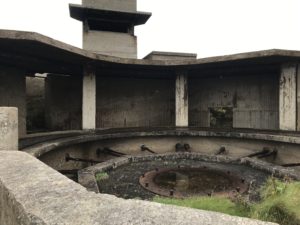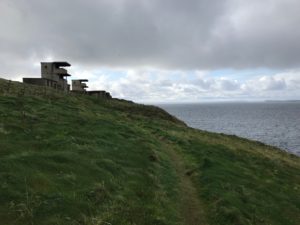In which Sid and Doris take the Narrow Road to the Deep South of Ronaldsay.
Yesterday was really old history and today was the turn of the twentieth century. Much to Sid’s chagrin the Wireless Museum has shut for the duration, just as he was looking forward to some slightly foxed maps of the Chain Home Low radar stations. Never mind, today is Sid’s day of Scapa Flow visiting.
The Orkney Islands surround Scapa Flow where the British navy sheltered in WW1. From here the fleet went out to fight at Jutland in 1916, just west of Denmark. The British fleet lost more ships (Admiral Beatty: There seems to be something wrong with our bloody ships today) but did enough that the German fleet didn’t come out again.
In November 1918 the German High Seas Fleet was escorted into Scapa Flow. Rather than let it fall into the hands of the British the crews scuttled them. Most of them were salvaged by enterprising locals. The metal salvaged from these and similarly aged vessels are a source of Low Background Steels – being built before the first nuclear tests they are not contaminated with atmospheric radionuclides from atomic weapons fall out. These metals can then be used in devices used for detecting radiation.
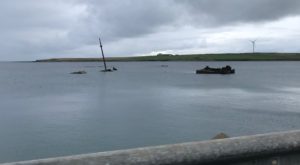 In the late 1930s the area saw some reinforcements and old ships were sunk in channels between the small islands to keep out submarines. Still, at high tide 14th October 1939 U-47 got through a gap and sank the Royal Oak with the loss of 835 of her crew of 1,234.
In the late 1930s the area saw some reinforcements and old ships were sunk in channels between the small islands to keep out submarines. Still, at high tide 14th October 1939 U-47 got through a gap and sank the Royal Oak with the loss of 835 of her crew of 1,234.
Then causeways were built between Lamb Holm, Burray and South Ronaldsay islands. Today we ran down that road. First stop the Italian Chapel at Camp 60 built by Italian PoWs (taken at Tobruk) who were put to work to build the causeways, which we know as “Churchill’s Barriers to keep out Jerry’s U-Boats”, but which everyone at the time including the PoW officers agreed were, “Useful Civilian Causeways that just happen to get in the way of sea traffic”, because PoWs cannot work on military installations, no matter how recently their government have changed sides again.
In their spare time the Italian team put two Nissan huts end to end, plaster boarded the inside and proceeded to decorate it with amazing trompe l’oeil. Building the barriers they had plenty of concrete to hand with which they moulded the altar. The outside was concrete covered and a portico put on the front. For today’s music perhaps the Faure Requiem?
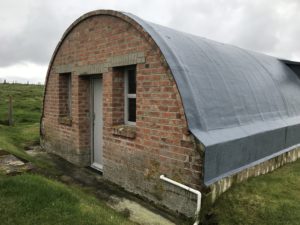 And because Sid and Doris are who they are, after a bit of enterprising legwork we can show you the view of the chapel from the other end so you can see the “before” picture.
And because Sid and Doris are who they are, after a bit of enterprising legwork we can show you the view of the chapel from the other end so you can see the “before” picture.
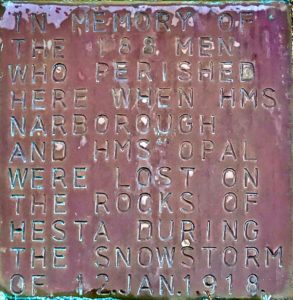 The next stop was to see birds. At Hesta we parked opposite the small memorial to HMS Opal and HMS Narborough that both ran onto rocks in a snow storm, having been recalled from an anti-mining patrol. They were not found for two days by which time 188 of 189 crew had died. (Number 189 was washed out to sea and picked up by a fishing boat – suffering extremely from exposure.)
The next stop was to see birds. At Hesta we parked opposite the small memorial to HMS Opal and HMS Narborough that both ran onto rocks in a snow storm, having been recalled from an anti-mining patrol. They were not found for two days by which time 188 of 189 crew had died. (Number 189 was washed out to sea and picked up by a fishing boat – suffering extremely from exposure.)
It would be interesting to read the findings of the enquiry. We went for a cliff walk and saw a cormorant and an oyster catcher. We are not here at peak birdie, even the enthusiastic guidebooks agree that.
Next up, the response to U-47. At Hoxa Head large batteries were set up with spotter towers, search lights, radar, induction loop sub detectors and remote controlled mines. From RAF Tern planes went out to attack submarines. Much of the concrete is still at Hoxa Head.
The view of the capital M Mainland from Hoxa Head reminds us that Orkney was classified as an Overseas Posting.
 One of the below ground paths looks very Skara Brae.
One of the below ground paths looks very Skara Brae.
We return damply to the Mini, past a building that Bothy observes would have commercial potential as a cafe. But it isn’t.
Dear God, I know You and I do not really believe in one another but could we have a day without rain? Back in Kirkwall (a town that seems not to have a newsagent) we feast on soup and cake. [Clarification: Soup. And then cake. D.] And because Doris is not yet sated with walking in the rain we go to see the harbour and marina. The fishing boats are coming and going but in the marina no boat moves. We see the next squall coming and it catches us before we get home.
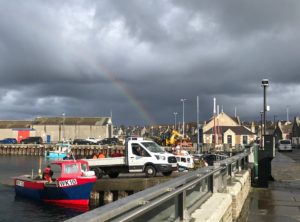
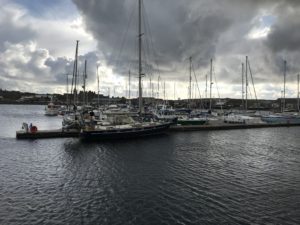
The next level of Covid lockdown has hit at six o’clock so we have beer from the Co-op and curry from the Indian Garden.

 In the late 1930s the area saw some reinforcements and old ships were sunk in channels between the small islands to keep out submarines. Still, at high tide 14th October 1939 U-47 got through a gap and sank the Royal Oak with the loss of 835 of her crew of 1,234.
In the late 1930s the area saw some reinforcements and old ships were sunk in channels between the small islands to keep out submarines. Still, at high tide 14th October 1939 U-47 got through a gap and sank the Royal Oak with the loss of 835 of her crew of 1,234. And because Sid and Doris are who they are, after a bit of enterprising legwork we can show you the view of the chapel from the other end so you can see the “before” picture.
And because Sid and Doris are who they are, after a bit of enterprising legwork we can show you the view of the chapel from the other end so you can see the “before” picture. The next stop was to see birds. At Hesta we parked opposite the small memorial to HMS Opal and HMS Narborough that both ran onto rocks in a snow storm, having been recalled from an anti-mining patrol. They were not found for two days by which time 188 of 189 crew had died. (Number 189 was washed out to sea and picked up by a fishing boat – suffering extremely from exposure.)
The next stop was to see birds. At Hesta we parked opposite the small memorial to HMS Opal and HMS Narborough that both ran onto rocks in a snow storm, having been recalled from an anti-mining patrol. They were not found for two days by which time 188 of 189 crew had died. (Number 189 was washed out to sea and picked up by a fishing boat – suffering extremely from exposure.)